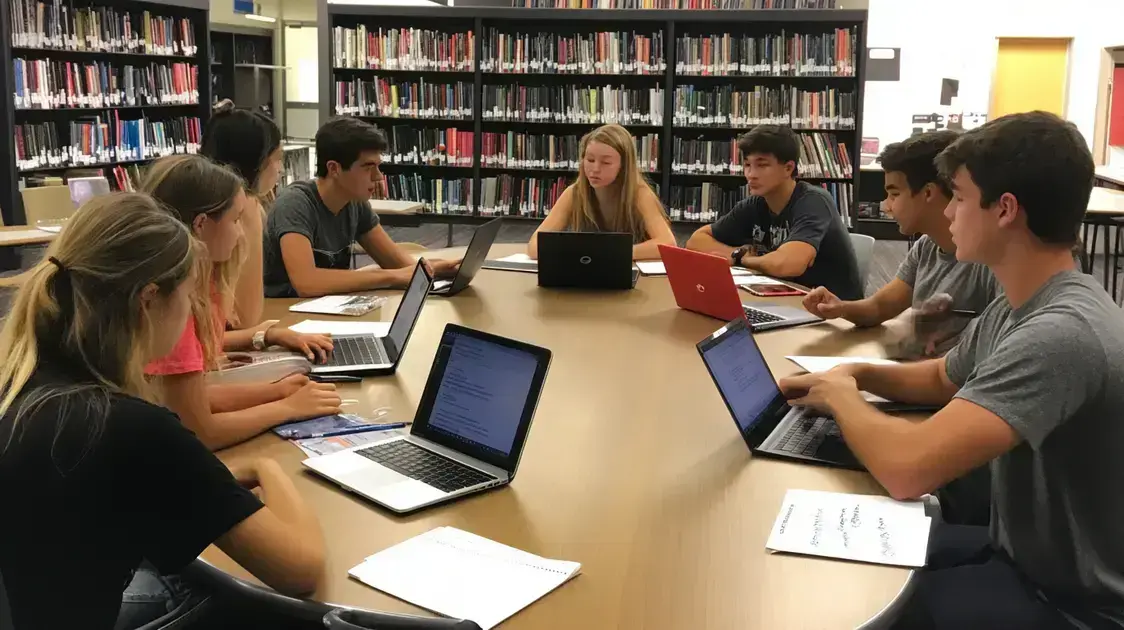Índice
Effective study tips can make a significant difference in your academic performance. Creating a structured study schedule helps manage your time and reduces last-minute stress. It’s also essential to identify the time of day when you’re most productive and use it to tackle more challenging subjects.
Collaborating with study groups can enhance understanding and retention. Sharing ideas, discussing topics, and teaching each other are powerful tools for reinforcing knowledge. Additionally, using diverse study resources like videos, flashcards, and practice tests caters to different learning styles and strengthens comprehension.
To stay motivated, set clear, achievable goals and reward yourself when you meet them. Don’t underestimate the power of rest and self-care—your mind performs best when your body is well. Keep reading to explore practical and proven strategies that will elevate your study habits and help you succeed.
Effective Study Habits
Developing strong study habits is essential for academic success. Creating a quiet, distraction-free environment and setting a consistent schedule can improve focus and retention. One of the most effective Study Tips is to break study sessions into manageable chunks with short breaks in between.
Active learning techniques like summarising notes, teaching others, and using flashcards can enhance memory. Another valuable Study Tips strategy is to regularly review material instead of cramming the night before an exam. This method helps reinforce knowledge and reduces stress.
Staying organised and setting clear goals boosts motivation and productivity. Prioritise difficult subjects when your energy is highest, and remember to rest and recharge. By applying these Study Tips, students can build routines that support long-term academic growth and confidence.
Creating a Study Schedule
Creating a study schedule is crucial in managing your time effectively and ensuring you cover all necessary material. Start by identifying your major subjects and topics. Write these down to get a clear overview of what you need to study.
Assess Your Availability
Look at your weekly routine to find available study slots. Be realistic about your time commitments, including classes, work, and personal activities. It can help to use a digital calendar or a physical planner to visualise your schedule.
Allocate Study Time Wisely
Distribute study sessions evenly across your subjects. Instead of cramming one subject in a day, aim to study different subjects throughout the week. This approach prevents burnout and helps maintain interest in your studies.
Include Breaks for Productivity
Integrate regular breaks into your study schedule. Short breaks during your study sessions will help keep your mind fresh and improve your focus. A 5-10 minute break every hour can make a significant difference in productivity.
Prioritise Difficult Subjects
Identify which subjects or topics you find more challenging and allocate more time to these areas. Studying difficult subjects when you are most alert can help enhance your understanding and retention of information.
Set Specific Goals
Each study session should have a specific goal, such as completing a chapter or practicing a set of problems. This creates a sense of achievement and helps keep you motivated.
Be Flexible
Life can be unpredictable, so be flexible. If something comes up and you can’t study as planned, adjust your schedule accordingly, rather than skipping the study session altogether.
Review your study schedule regularly. Make adjustments as necessary to adapt to your progress, upcoming exams, or topics that may need more attention. Staying organised will offer a stronger path towards your academic success.
Utilising Study Groups

Utilising study groups can enhance your learning experience and provide different perspectives on the material. Studying in a group setting allows you to share knowledge, ask questions, and explain concepts to others, which can reinforce your understanding.
Find the Right Group
When creating or joining a study group, choose individuals who are motivated and committed to their studies. A mix of different strengths can benefit everyone, as each member can contribute unique insights and knowledge.
Set Clear Goals
Before starting, establish clear goals for each study session. Decide on the topics to cover, questions to answer, or problems to work on. This helps keep the group focused and productive.
Establish a Regular Meeting Schedule
Consistency is key. Set a regular meeting time that works for all members. Regular study group sessions help maintain momentum and make studying a habit.
Utilise Different Resources
Bring various resources to your study group, such as textbooks, online articles, or videos. Collaboratively exploring these resources can deepen your collective understanding and make studying more engaging.
Encourage Participation
Encourage all members to participate actively. This means asking questions, sharing findings, and discussing concepts in depth. Participation will help clarify doubts and expose different viewpoints.
Stay on Topic
While it’s fine to have fun and socialise, ensure that the focus remains on studying. Assign a member to guide the session and keep discussions on track to make the most of your time.
Review and Recap
At the end of each study session, take a few minutes to review what you learned. Each member can summarise key points, which helps reinforce knowledge and retains vital information.
Techniques for Better Concentration
Improving focus is essential for mastering effective Study Tips. Start by eliminating distractions like phones and noise, and try methods like the Pomodoro Technique—25 minutes of focus followed by a 5-minute break. These small habits can boost productivity without feeling overwhelming.
Mindfulness is another useful Study Tip. Short breathing exercises or meditation sessions help clear your mind and sharpen focus. Setting clear goals before each study session also keeps you on track and more motivated to finish your tasks.
Healthy habits support better concentration. Stay hydrated, eat brain-boosting snacks, exercise regularly, and stick to a sleep routine. By combining wellness with practical Study Tips, you build a strong foundation for academic success. Explore more Study Tips to enhance your study sessions.
Resources for Study Aids
Having the right tools and platforms is essential to apply effective Study Tips. Online learning platforms like Khan Academy and Coursera offer structured lessons, while apps like Anki and Quizlet help reinforce memory through flashcards. These digital aids simplify complex topics and make studying more interactive.
Exploring digital libraries, blogs, and YouTube channels can also improve your study routine. Whether through TED-Ed videos or educational podcasts, these resources present information in engaging formats. Including them as part of your Study Tips adds variety and depth to your learning experience.
Finally, using organisers like Notion or checking your school library’s resources can boost your productivity. Staying organised is one of the most practical Study Tips for keeping focus and managing time effectively. Combine these tools to create a personalised and efficient study system.
Maintaining Motivation

Staying motivated while studying can be tough, but incorporating the right Study Tips can make a big difference. Start by setting small, achievable goals and rewarding yourself for meeting them. Whether it’s a quick snack or a short break, rewards keep you going and make the process more enjoyable.
Adding variety to your routine is one of the most effective Study Tips. Changing your study location, using different resources, or trying new methods can prevent boredom. Connecting with friends or study groups also boosts motivation through shared goals and accountability.
A positive mindset and an organised space can go a long way. Surround yourself with motivation, visualise your success, and keep your materials tidy. These simple Study Tips help you stay focused, motivated, and ready to tackle challenges. Explore more powerful Study Tips to stay inspired during your academic journey.
Tips for Exam Preparation
Effective exam preparation is crucial for success. Here are some tips to help you prepare well and feel confident on exam day.
Create a Study Plan
Begin your exam preparation by creating a comprehensive study plan. Outline topics to cover, allocate time for each subject, and stick to the schedule. Having a clear plan helps you manage your time effectively and reduces stress.
Review Past Papers
Practising past exam papers can give you a better understanding of the exam format and question styles. Work through these papers under timed conditions to improve your time management skills and identify areas where you need more practice.
Focus on Key Concepts
Prioritise key concepts and topics that you find challenging. Use your class notes, textbooks, and study aids to focus on these areas. Understanding the main ideas can help you answer questions more effectively during exams.
Form Study Groups
Join or form study groups with classmates to review material. Discussing topics with others can clarify doubts, reinforce learning, and provide different viewpoints that enhance your understanding.
Take Care of Yourself
Maintain your physical and mental well-being during exam preparation. Get enough sleep, eat healthy meals, and incorporate regular exercise into your routine. A healthy body and mind are essential for optimal performance.
Practice Mindfulness Techniques
Mindfulness techniques such as meditation and deep breathing can help manage anxiety. Taking a few moments to centre yourself can calm your nerves and improve focus as your exam approaches.
Organise Your Exam Materials
Ensure that you have all the necessary materials ready for exam day, including pens, pencils, your ID, and any permitted resources. Organising these items the night before can save time and reduce last-minute stress.
FAQ – Frequently Asked Questions about Study Tips
What are some effective study habits?
Effective study habits include setting specific goals, creating a study schedule, and utilizing active learning techniques.
How can I create a study schedule?
To create a study schedule, assess your weekly routine, allocate time for each subject, and include regular breaks to boost productivity.
What benefits do study groups offer?
Study groups provide different perspectives, promote accountability, and allow for collaborative learning which can enhance understanding of topics.
What techniques can improve concentration while studying?
To improve concentration, eliminate distractions, practice mindfulness, and use techniques like the Pomodoro Technique which encourages breaks.
What resources are available for study aids?
Useful study aids include online learning platforms, flashcard apps, e-books, educational podcasts, and study blogs.
How can I maintain motivation while studying?
Maintaining motivation can be achieved by setting achievable goals, creating a reward system, and mixing up your study routine to keep things interesting.
Check out our article on Time-Saving Tricks to discover clever strategies for making the most of your day and boosting productivity.
